|
There was a time not so very long ago when Oliver Stone was one of the most compelling and talked-about figures in American cinema. A Vietnam veteran who freely admits to spending a few years in a drug haze, he has a catalogue of internationally acclaimed features to his name but remains to this day a filmmaker who seriously divides opinion. Pauline Kael famously stated that one of the upsides of retiring from film criticism was that she would never have to watch another Oliver Stone film, and Stone's repeated tinkering with historical fact has earned him his share of very vocal detractors. But he is also a filmmaker of considerable talent and fierce conviction, as well as being that rarest of modern-day beasts – a politically committed filmmaker working within the Hollywood system. Stone's technical skills have been repeatedly demonstrated – the dazzling editing of JFK and the eye-popping experimentation of Natural Born Killers are just two examples – but it's the passion he brings to his best work that really marks it out. And nowhere is this more evident than in his blistering third feature, Salvador.
Based on a true story, Salvador opens on down-on-his-luck journalist Richard Boyle (James Woods) at somewhere close to rock bottom. He is broke, facing eviction from his run-down apartment and about to lose his young child and his angry, at-her-wits-end Italian wife. He badly needs a job, but his volatile temper and twitchy unreliability have rendered him almost unemployable. Believing there may be a story down in politically unstable El Salvador, he tricks his pill-popping friend Dr. Rock (Jim Belushi) into accompanying him on what Boyle claims will be an enjoyable trip, a combination of work and pleasure in a country in which he has political enemies but powerful friends and a single-mother girlfriend he has not seen for some time. But El Salvador is a dangerous and unpredictable place, and Boyle quickly finds himself unable to maintain his cheerful cynicism and stay detached from the social upheaval he initially went there to record.
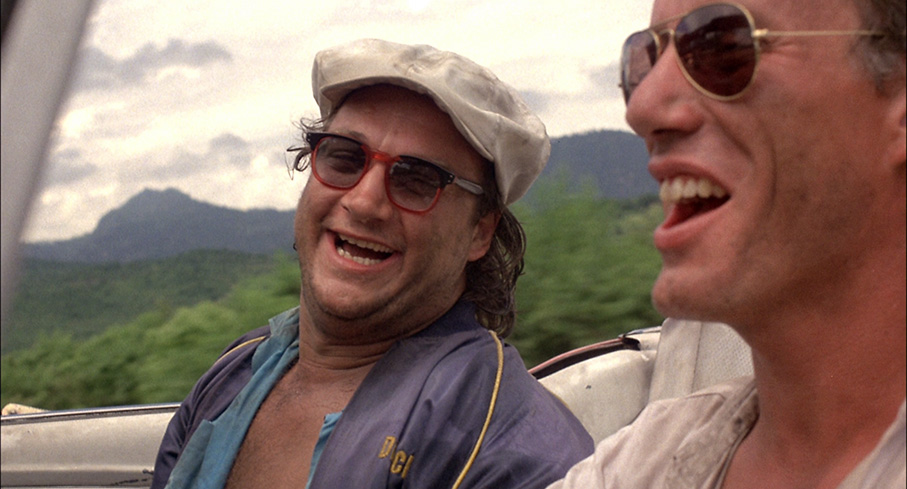
Stone sets up his characters and story with impressive but almost invisible economy. In just fifteen minutes of screen time, he introduces us to Boyle and Rock, establishes the full extent of Boyle's financial, relationship and work-related problems, separates him from his wife, provides a detailed breakdown of his personality traits and his friendship with Rock, and transports them both to El Salvador and into the belly of an armoured vehicle, convinced that they are about to be killed by the local militia. It's a breathless, brilliant opening that effortlessly blends drama, comedy, politics and nail-biting tension – despite occurring far too early to present a logical threat to the lead characters' safety, Boyle and Rock's genuine belief that they are about to die is vividly conveyed. These scenes also provide a wealth of character detail about Rock and (especially) Boyle, both of whom I found myself instantly warming to. Both are outsiders, reckless adventurers who embody that wilder side that we may acknowledge but tend to keep in check and secretly dream of being able to let run free. Intriguingly, it's also this element that alienated some critics, with Leonard Maltin complaining that the film took its time to engage him because "the two lead characters are such incredible sleazeballs." For me, this was always a key aspect of their appeal.
Events are almost exclusively centred around Boyle (the screenplay is based on the real-life Richard Boyle's autobiography, who also co-wrote the screenplay with Stone and acted as advisor on the film), who is electrifyingly played here by James Woods, who was up for an Oscar and should really have won it but lost out to sentimentality – Paul Newman was damned good in The Color of Money but come on! Woods plays Boyle with the kind of high-octane energy and fierce intensity that ensures you don't have to warm to him to find him compelling as a character, a self-destructive and self-centred opportunist whose gradual conversion to humanitarianism is impeccably handled and utterly believable. There is a burning rage and devastating honesty to Woods' portrayal that for me makes it not only the finest performance of the actor's career (such a shame – particularly given this film's political commitment – that he is now known primarily as a spokesman for angry conservatism), but one of the most compelling in modern American cinema.
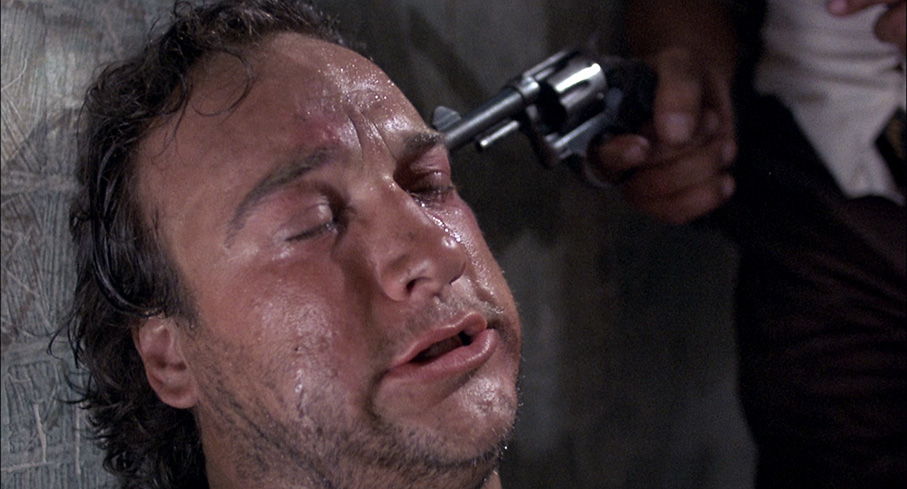
But he is never isolated here. In only his second major dramatic feature role (after Michael Mann's Thief, where he was also terrific), James Belushi has never been better, with his memorable comic moments – the sequence in which he spikes the drink of pompous TV journalist Pauline Axelrod (Valerie Wildman) with acid is a hoot – balanced by scenes in which he really gets to demonstrate his acting metal. One of my favourites takes place when Boyle returns to the township in which he and Rock have become residents to be confronted by the tortured and murdered body of a young man whose life he earlier tried desperately to save. Rock is standing with others, even more drunk than usual, and after blasting out a convincingly drunken shout of "Boyle!" woefully points to where the man's body is lying, blurting out with an extraordinary blend of anger and anguish, "He's fucked up! Over there, man – he's really fucked up bad!" It's an almost throwaway moment, captured in wide shot, but there's something so painfully real about Belushi's delivery and the non-specific nature of the line that it gets me every time I watch the film. This air of authenticity that's carried through to the supporting cast, particularly the too-rarely used John Savage as committed Newsweek photographer John Cassady and Michael Murphy as American Ambassador Thomas Kelly, while as Boyle's Salvadorian girlfriend Maria, Mexican actor Elpidia Carrillo gives a performance that helped to launch her on a successful film and TV career in Hollywood. Even the smallest roles here have been cast with care.
While Stone has built his narrative around actual events, they inevitably serve as a backdrop for the political and emotional awakening of a troubled outsider, and the story is primarily told from his perspective. The director's legendary tinkering with the facts aside, this leaves the film open to the charge of presenting a Central American political upheaval from a North American viewpoint. It's thus to Stone's credit that key historical incidents – the assassination of Archbishop Romero; the uncovering of the bodies of a group of murdered nuns – are staged and filmed with almost documentary realism, even if the events leading up to them are partially fictionalised to personalise them within the narrative of the film. Stone also kicks against the establishment viewpoint of the day by siding primarily with the rebels – the ruling, US-backed right-wing government is portrayed as corrupt, immoral and even murderous.
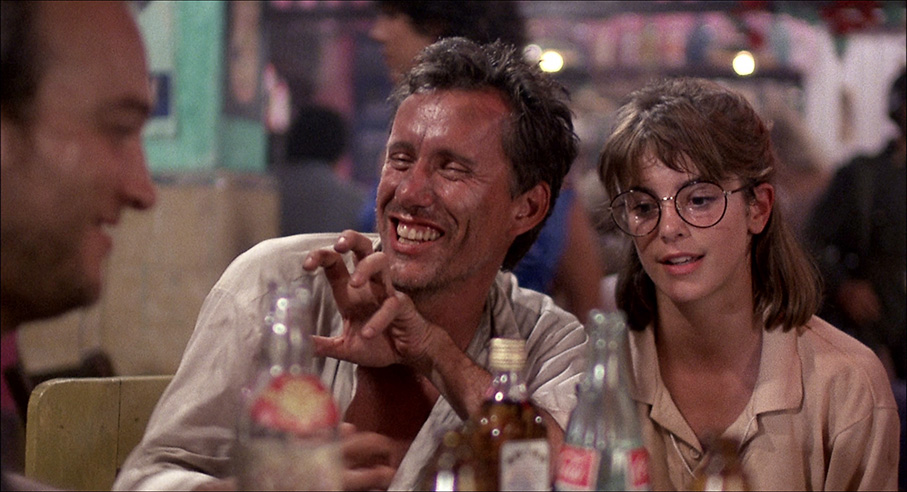
This realistic approach is honourable and often persuasive, but occasionally Stone comes close to overplaying his hand. The true-life rape and murder of a party of American nuns is as horrifying as it should be, and its aftermath is shocking, but while the yobbish nature of the rapists is likely close to the truth, the low angle shot of one of them leering and slobbering over his victim pushes him unnecessarily towards caricature – it's almost as if Stone does not trust us to be appalled by the assault alone and feels the need to point out to even the slowest audience member that these guys are monsters. The same is true of the sequence in which Major Max (Tony Plana) selects a loyal member of his staff to assassinate Archbishop Romero, an overly 'performed' scene that sits uneasily with the surrounding naturalism.
But these are small blips in an otherwise thunderously effective and immaculately crafted work. The film repeatedly plays with our emotions to sometimes devastating effect, hitting hard when we least expect it and building to sequences of genuinely fingernail-chewing tension. It also carries a potent political message about misplaced US support for fascistic Central American governments in a way that never feels like a diatribe, partly because it is so well integrated into the narrative and is delivered with genuine passion and conviction. This is particularly evident in the scene where Boyle berates the American military representative Colonel Bentley Hyde for his simplistic judgements, ending with this assessment of his own position: "Left wing? Maybe. But I am not a Communist. And that's the trouble with you people, you've never been able to tell the difference!"
Salvador was the first Oliver Stone film I saw (I caught it in London just a week before Platoon opened and transformed the director's career), and despite some stiff competition it remains my favourite. It stands today, along with Roger Spottiswoode's Under Fire (special edition Blu-ray release please!) as one of the very finest examples of 80's American journalist-as-hero political cinema. Would that there was someone doing such work today.
An impressively robust 1.85:1 1080p HD transfer of a film I remember primarily for its documentary grittiness, one whose detail is well defined, whose colours are naturalistic and cleanly rendered, and whose contrast range is nicely balanced, delivering solid black levels and clearly-defined highlights, with no crushing of shadow detail even in darker scenes. Film grain is visible and feels right for the image and the picture is clean of dust and damage.
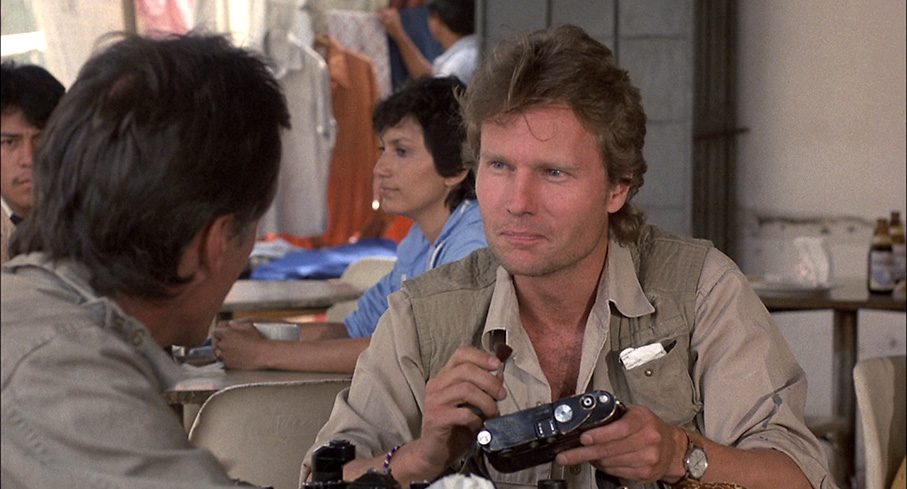
You have the option here to play the film with the original mono soundtrack as Linear PCM 2.0 and this is impressively clear and with no obvious sign of damage or wear. The DTS-HD 5.1 surround remix is noticeably superior, however, with better bass response even on dialogue, which has a fuller feel on the DTS track, something that immediately strikes you if you switch between the soundtracks in the middle of a dialogue-heavy scene. The music and background sound are also spread wider on this track, giving it a more inclusive feel.
Optional English subtitles for the deaf and hearing impaired have been included.
Oliver Stone Audio Commentary
One of several special features sourced from the previous MGM DVD, this commentary from director Oliver Stone has a few dead patches, but when Stone does speak he really delivers, providing some welcome insight into the film's production, the real-life Richard Boyle on whom Woods' character is based, the true story behind some of the more prominent scenes, and his own strongly held political beliefs. There are some revealing details on how funding for the film was secured using methods that were not always above board, and some nice information about the casting of small roles: Stone's newly born son plays Boyle's child in the opening scene; the cop who arrests Boyle over his outstanding parking tickets by top female professional bodybuilder Sue Ann McKean; and small but memorable support roles are played by the film's stills photographer Gary Farr and first assistant director Ramón Menéndez. Stone is a knowledgeable and intelligent speaker and a man of considerable passion and commitment, something that really comes through here.
Oliver Stone Audio Interview (1986) (63:54)
Recorded at the BFI in 1986 after a preview screening of Salvador, which the unnamed host (who is only identified by his first name, Adrian, so I'm taking a guess at film writer Adrian Turner – this may be clarified in the booklet) describes as the best film he's seen that year. Stone is, as ever, a compelling interviewee, calmly and thoughtfully asking questions about the original plan to shoot the film in El Salvador, the concept of the journalist as hero, the liberal undercurrents in Scarface (which Stone wrote), working with right-wing directors John Milius and Michael Cimino, the collapse of liberalism in America, and more, including some discussion about Platoon, which at this point is still in post-production. As so often with such extras, the audience questions are hard to make out, but some are clarified before Stone gives his answer and others you can estimate from how he replies. It's revealed that Jim Belushi is in the audience and he improvises a story of how Dr. Rock eventually returned to America, and when Stone refers to the 'difficult' Mexican censor they had on set, he recalls that she liked Belushi a lot, to which Belushi responds with a sardonically affirmative, "Oh yeah." One of the most telling comments from Stone comes when is asked what would need to happen for us to see a different type of moviemaking come from America, to which he responds, "You'd have to shoot all of the executives."
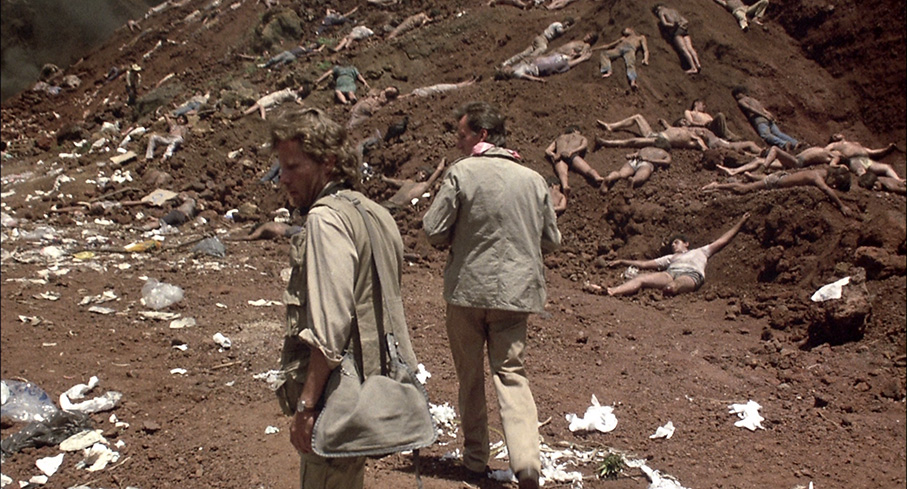
Oliver Stone at the BFI (42:13)
This consists of excerpts from of a video recording of Stone being interviewed on stage at the National Film Theatre on 19 January 1994 by politically committed journalist John Pilger after a screening of Heaven & Earth. Pilger is a long-time fan of Stone's work, which is neatly illustrated early on when he says that when he first saw Salvador he couldn't believe his eyes and was astonished that this film was made and distributed, to which Stone quickly responds (referring to the distribution), "It wasn't." Once again, Stone proves an enthralling interviewee, and talks about working with John Milius, financing Salvador through British company Hemdale, the religious aspects of Heaven & Earth, getting funding for films that question America, the notion that everything is political in some way, the impact of the Vietnam war on his work, and lots more. Many of the audience questions are once again hard to make out, though most are repeated or summarised by Pilger, and there are a couple of choice quotes here from Stone, who at one point states that, "Organised religion is for people who fear hell and spirituality is for people who've been to hell," and intriguingly suggests that, "We live in a seducible fascist hinterland."
Into the Valley of Death (62:52)
This documentary about the making of the film is an absolute treat and one of the finest 'making-of' extras I have yet encountered. Running for just over an hour and presented in letterboxed 16:9 within a 4:3 frame (I'm assuming this was sourced from a standard definition original, but it generally looks better than that might sound), it charts the chance birth and troubled production of the film, and includes interviews with many of the key participants, including Oliver Stone, James Woods, Richard Boyle and Robert E. White, the real-life US Ambassador to El Salvador at the time and the man on whom Michael Murphy's character is based. White's contributions in particular prove invaluable, providing a good deal of the historical and political background to the story and highlighting which elements were based directly on fact. There is also some fascinating archive material, including documentary footage of the El Salvadorian civil war, behind-the-scenes and deleted footage from the movie (which is included in full elsewhere on this disc), even the real-life Boyle auditioning to play himself in the film (sorry, but no way). One of the most remarkable aspects of these interviews is how brutally honest many of them are about the problems and personality clashes that more than once nearly brought the production to its knees. Says Stone at one point of his sometimes tempestuous relationship with Woods, "There were times when I wanted to kill him, I mean kill him, really kill him. I never felt the urge to violence as I did in that movie since Vietnam," which is neatly balanced by Woods' own story of how his protestations about checking the chamber of a rifle probably saved his life. A terrific extra.
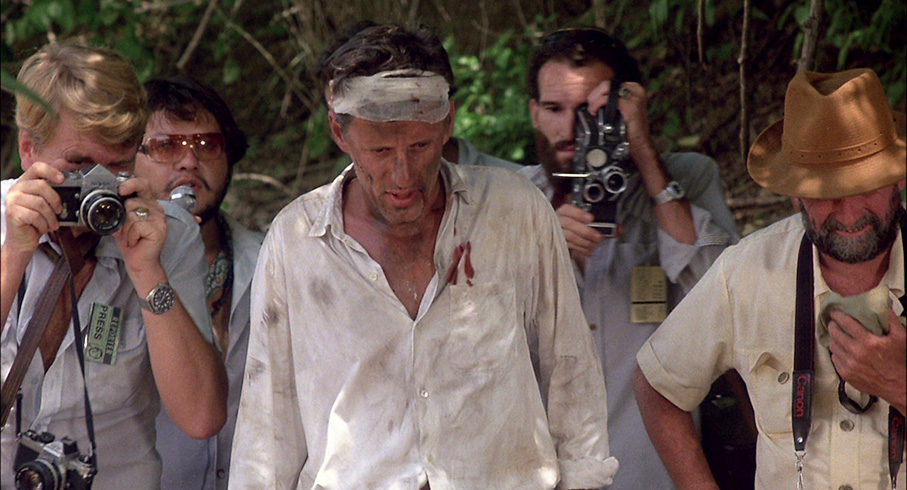
Deleted and Extended Scenes (27:48)
The material included here is certainly interesting and gives familiar sequences a little extra bite, notably Boyle's confrontation with a journalist-hating worker in a hotel bar, while a parting conversation between Boyle and Pauline Axelrod suggests the two have more respect for each other and even like each other more than you'd realise from the film itself. Other scenes, though, have clearly been dropped for good reason – Major Max's encounter with two American image makers makes a worthwhile political point, but the characters are cartoonlike parodies who bring a farcical element to a scene that would have felt sorely out of place had it been included. Interesting also to see how Dr. Rock's presence in the El Playon dawn patrol sequence negatively impacts on its sombre tone. All are framed 4:3 and look as if they've been sourced from a standard definition tape original, but the footage included here is too valuable to start carping about the quality.
US Theatrical Trailer (1:59)
A neatly edited sell that effectively captures the flavour and energy of the film. Frankly, I'd rush to the cinema.
Also included is a Collector's Booklet featuring a new essay by critic and journalist Barry Forshaw, extracts from the film's original press-book, and archival imagery, but this was not supplied for review.
A still terrific film with career-best performances from Woods and Belushi lands its best release yet, with an excellent HD transfer backed by all the special features from the previous DVD and a couple of first-rate additions unique to this release. As I stated earlier, this remains my favourite Oliver Stone film, and is the one I still go back to most often, and this is the edition I've been unknowingly waiting for. Highly recommended.
This review has been updated from our previous DVD review of the film.
|